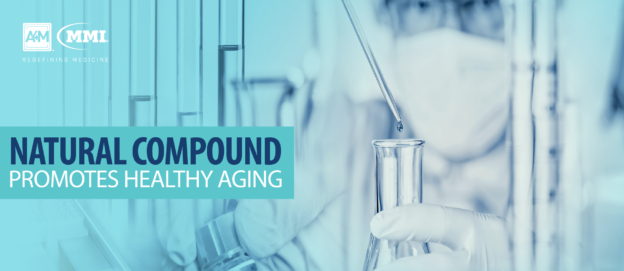The seven human sirtuins (SIRT 1-7), or NAD-dependent deacetylases, have been strongly correlated with human longevity due to their connection with metabolic function, aging, and the development of age-related diseases. In recent years, the protein SIRT1 has received the most attention due to its influence on gene regulation, genomic stability, and energy metabolism, garnering interest among the scientific community as a potentially viable pharmacologic therapy for the prevention of several health conditions, including type 2 diabetes, obesity, cancer, as well as cardiovascular and neurodegenerative diseases.
Several compounds have been found to impact the activation of sirtuins, including resveratrol which can be found in red wine, peanuts, pistachios, certain fruits, and cocoa. In small amounts, resveratrol may be able to replicate the health benefits of the steroid hormone estrogen, known for regulating reproduction, protecting against certain age-related diseases such as metabolic syndrome and Alzheimer’s disease.
A new study conducted in the United Kingdom aimed to uncover the mechanisms underlying resveratrol’s health benefits, its association with sirtuin proteins, and its ability to protect against age-related diseases; the latest findings were published in Scientific Reports.
Resveratrol and Healthy Aging
Small amounts of resveratrol – commonly found in red wine, berries, and chocolate – may be able to replicate the beneficial effects of estrogen in preventing metabolic diseases and cognitive decline. Larger amounts, on the other hand, may have the opposite effect, according to the study’s authors.
By activating estrogen receptors, the compound in turn activates sirtuin proteins to exert its physiological effects. Sirtuin proteins play a significant role in the healthy aging process as they control mitochondrial biogenesis, promote DNA repair, and help regulate metabolic function. They are believed to protect the body against several age-related diseases and are thought to have excellent potential drug targets according to the scientific community; however, clinical applications of the proteins remain unclear. Even still, there remains a lack of understanding of how sirtuin signaling translates to increased healthspan in human beings.
Studying Sirtuin-Activating Compounds
Led by Dr. Henry Bayele, molecular biologist at the University College London, researchers conducted an in vitro study of human liver cells which exposed them to a variety of dietary compounds aimed at activating sirtuin proteins. Collectively known as dietary sirtuin-activating compounds (dSTACs), resveratrol and isoflavones, such as daidzein, are natural activators in comparison with other synthetic compounds developed to spur sirtuin signaling. Researchers found that at low doses, resveratrol increased sirtuin signaling in cells by mimicking estrogen although, at high doses it actively reduced signaling.
“Numerous studies in animals have suggested that these proteins could prolong healthy lifespan by preventing or slowing disease onset,” Dr. Bayele told Medical News Today. “But developing effective drugs or dietary interventions has been frustrated by a lack of a common understanding of how exactly they work in the body’s cells.”
The study’s findings support the notion that small amounts of red wine can promote healthy aging as can other dietary components; Dr. Bayele reported that the compound present in licorice, isoliquiritigenin, is even more effective at activating sirtuins. His research supports the claim that dSTACs can be viewed as “plant estrogens”, benefiting human health by performing functions that estrogen would typically be responsible for.
Implications for Anti-Aging
Emerging evidence supportive of resveratrol’s benefits could lead to the development of alternatives to hormone replacement therapy – which can increase the risk of cardiometabolic disease – for menopause patients. However, further clinical studies are required to confirm whether individuals using dSTACs as estrogen substitutes to promote healthy aging display positive results.
“Regular low doses of resveratrol, such as through moderate consumption of red wine as part of a healthy diet, may be able to provide the benefits of estrogen,” Dr. Bayele explained. “This would apply to both men and women of all ages, but postmenopausal women may feel these benefits the most because they have lower estrogen reserves than men of a similar age.”
Dr. Bayele and his colleagues caution that the effects of dSTACs on cells in vitro found in their study may not reflect their effects in human subjects. For instance, the body may digest resveratrol compounds in the gut or metabolize them in the intestinal microbiota. If they do survive digestion intact, the absorption of the compounds into the bloodstream may be poor or the liver may break them down during digestion. Hence why additional study is needed to develop novel strategies for effectively delivering resveratrol for maximum benefit.

